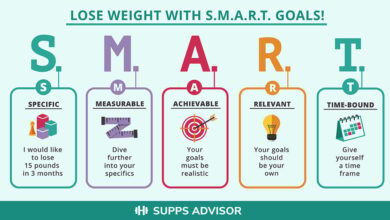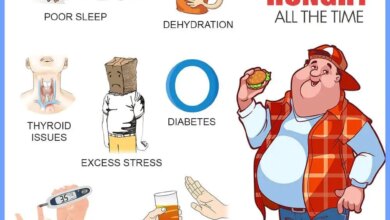
7 Things You Should Expect When Going Keto
7 Things You Should Expect When Going Keto: Embarking on the ketogenic diet can be a transformative journey, but it’s essential to understand what to anticipate along the way. From the initial adjustment period to the potential benefits and side effects, this guide will equip you with the knowledge you need to navigate your keto experience successfully.
The ketogenic diet, often referred to as keto, is a high-fat, low-carbohydrate eating plan that forces your body to enter a metabolic state called ketosis. In ketosis, your body begins to burn fat for energy instead of carbohydrates, leading to various potential benefits, including weight loss, increased energy, and improved mental clarity.
However, the transition to keto can also come with its share of adjustments and potential side effects.
Initial Keto Flu: 7 Things You Should Expect When Going Keto
The keto flu is a common experience for many people starting the ketogenic diet. It’s a group of symptoms that can occur as your body adjusts to using fat as its primary energy source instead of carbohydrates.
Symptoms of the Keto Flu
The keto flu is characterized by a range of unpleasant symptoms, including:
- Headache
- Fatigue
- Nausea
- Constipation or diarrhea
- Muscle cramps
- Difficulty concentrating
- Irritability
- Bad breath
Duration of the Keto Flu
The keto flu typically lasts for a few days to a week, but it can vary from person to person. Some people may experience it for only a day or two, while others may feel its effects for a longer period.
Tips for Mitigating the Keto Flu
While there’s no guaranteed way to prevent the keto flu, several strategies can help minimize its severity and duration:
- Stay hydrated:Drink plenty of water, electrolytes, and low-carb beverages like unsweetened tea or coffee.
- Eat enough electrolytes:Sodium, potassium, and magnesium are essential electrolytes lost through urine during the initial phase of ketosis. Ensure you’re consuming enough through food or supplements.
- Gradually reduce carbs:Instead of drastically cutting carbs overnight, gradually decrease your intake over a few days.
Going keto can be a wild ride! You’ll experience changes in energy levels, cravings, and even your sleep patterns. It’s important to remember that stress can exacerbate these side effects, so taking time for self-care is key. Check out this article on 8 quick ways to reduce stress right now for some helpful tips.
Once you’ve got your stress under control, you’ll be better equipped to handle the keto journey and enjoy its potential benefits!
This allows your body to adjust more smoothly.
- Get enough sleep:Adequate rest is crucial for your body to adapt to the ketogenic diet.
- Consider taking supplements:Some people find that supplements like magnesium, potassium, and B vitamins can help alleviate keto flu symptoms.
Increased Energy Levels

One of the most commonly reported benefits of the ketogenic diet is a surge in energy levels. Many people find that they feel more alert, focused, and capable of tackling their day with renewed vigor. This boost in energy is often attributed to the way the body utilizes fat for fuel when on a ketogenic diet.
The Role of Ketones in Energy Production
When you restrict carbohydrates, your body enters a state called ketosis. In this state, your liver starts converting fat into ketones, which are then used as an alternative fuel source by your brain and other tissues. This process is called ketogenesis.
So, you’re thinking about trying the keto diet? It’s a popular choice, but you’ll want to be prepared for some changes. One of the biggest things you’ll need to adjust to is the focus on healthy fats, and that’s where delicious salads come in! Check out these diets and recipes for meal-worthy salads to get inspired.
Besides delicious salads, you’ll also want to expect changes in your energy levels, cravings, and even your sleep patterns. It’s all part of the keto journey, and with the right mindset and a little preparation, you’ll be ready to take on the challenge.
Ketones are a more efficient source of energy than glucose, which is derived from carbohydrates. They provide a steady and sustained energy supply, eliminating the energy crashes that can occur with a high-carbohydrate diet.
Changes in Appetite

One of the most noticeable changes you might experience on a ketogenic diet is a shift in your appetite. You might find yourself feeling less hungry overall, or you might experience periods of intense hunger followed by periods of feeling full quickly.
These fluctuations are a common part of the keto adaptation process and are often influenced by hormonal changes.
Hormonal Influence on Appetite
The ketogenic diet can significantly impact the hormones that regulate appetite. Here’s how:* Leptin:This hormone signals to your brain that you’re full. On keto, your body may produce more leptin, which can contribute to feeling less hungry.
Ghrelin This hormone stimulates hunger. On keto, ghrelin levels may decrease, leading to a reduction in hunger cues.
Insulin This hormone plays a role in regulating blood sugar levels and appetite. When you’re on keto, your insulin levels tend to be lower, which can reduce hunger signals.
Going keto can be a rewarding journey, but it’s important to be prepared for the changes ahead. You’ll likely experience increased energy, better sleep, and a sharper mind, but you might also face cravings and social challenges. To keep things interesting, try incorporating new keto-friendly recipes into your diet.
For example, check out 11 healthy pizzas under 400 calories for a satisfying and low-carb alternative. These pizzas are perfect for a cheat meal or a fun way to enjoy your favorite food while staying on track with your keto goals.
Strategies for Managing Appetite Changes
While the keto diet can lead to changes in appetite, there are several strategies you can employ to manage these fluctuations:* Stay Hydrated:Dehydration can often be mistaken for hunger. Make sure you’re drinking plenty of water throughout the day.
Focus on High-Fat, Low-Carb Foods Prioritize foods rich in healthy fats like avocados, olive oil, and fatty fish. These foods can help you feel satiated for longer.
Eat Slowly and Mindfully Take your time while eating and pay attention to your body’s hunger and fullness cues.
Don’t Skip Meals Skipping meals can disrupt your metabolism and make it harder to manage your appetite.
Get Enough Sleep Lack of sleep can disrupt your hormone balance and lead to increased hunger. Aim for 7-8 hours of quality sleep each night.
Manage Stress Stress can also trigger hunger cravings. Find healthy ways to manage stress, such as exercise, meditation, or spending time in nature.
Potential Side Effects
While the keto diet offers many health benefits, it’s important to be aware of potential side effects. These side effects are generally temporary and manageable, but understanding them can help you navigate the transition to a ketogenic lifestyle.
Keto Flu
The keto flu is a common side effect experienced during the initial days or weeks of starting the keto diet. It is characterized by a range of symptoms, including headaches, fatigue, nausea, constipation, and difficulty concentrating. These symptoms are often attributed to the body’s transition from using glucose as its primary energy source to burning fat, a process called ketosis.
The body needs time to adapt to this metabolic shift, which can lead to these temporary discomforts.
Electrolyte Imbalance
The keto diet can cause an electrolyte imbalance, particularly in sodium, potassium, and magnesium. This is because when you reduce carbohydrate intake, your body loses water and electrolytes through urine. This can lead to various symptoms like muscle cramps, fatigue, headaches, and dizziness.
Digestive Issues
The keto diet can initially cause digestive issues, such as constipation, diarrhea, or gas. This is because the high-fat content can take some time for your digestive system to adjust to.
Increased Risk of Kidney Stones
A ketogenic diet can increase the risk of kidney stones in some individuals. This is because the high protein intake can increase the amount of uric acid in the urine, which can contribute to stone formation.
Nutrient Deficiencies
The keto diet can restrict certain nutrients, such as fiber, vitamin C, and some B vitamins. It’s essential to ensure you’re getting enough of these nutrients through other sources or supplements.
Mental Fog, 7 things you should expect when going keto
Some people experience mental fog or difficulty concentrating during the initial stages of the keto diet. This is often attributed to the body’s adaptation to using ketones as its primary energy source.
Long-Term Sustainability
The ketogenic diet, while promising for short-term weight loss and metabolic benefits, presents challenges when it comes to long-term adherence. Maintaining a keto lifestyle requires a significant shift in eating habits and lifestyle choices.
Strategies for Long-Term Adherence
Long-term success on the keto diet hinges on finding strategies that make it sustainable and enjoyable.
- Focus on Real Foods:Prioritize whole, unprocessed foods like vegetables, meats, and healthy fats. This approach not only aligns with the keto principles but also promotes overall health and well-being.
- Plan and Prepare Meals:Prepping meals ahead of time can help you avoid unhealthy choices when you’re short on time. Batch cooking and meal planning can make it easier to stay on track.
- Find Support:Connect with others who are following a keto diet. Online communities, support groups, or even friends and family who are on the same journey can provide encouragement and accountability.
- Be Flexible:Don’t be afraid to adjust your approach. If you find yourself struggling, consider incorporating occasional cheat meals or days to avoid feeling deprived.
- Listen to Your Body:Pay attention to how you feel on the keto diet. If you experience any adverse effects, consult with a healthcare professional to determine if adjustments are necessary.
Long-Term Health Outcomes
While the long-term health effects of the keto diet are still being studied, some research suggests potential benefits.
- Weight Management:Keto can be effective for weight loss in the short term, and some studies suggest it may be more sustainable than other diets for maintaining weight loss over time.
- Metabolic Health:Keto may improve insulin sensitivity, reduce blood sugar levels, and lower triglycerides, potentially reducing the risk of type 2 diabetes and heart disease.
- Neurological Benefits:Some studies suggest that keto may have benefits for individuals with neurological conditions like epilepsy, Alzheimer’s disease, and Parkinson’s disease.
It’s important to note that the keto diet is not a one-size-fits-all approach. Some individuals may experience adverse effects, and it’s crucial to consult with a healthcare professional before starting any new diet.
Closing Summary
The ketogenic diet offers a unique approach to nutrition, potentially leading to significant changes in your body and mind. While the initial transition might involve some challenges, understanding the common experiences and strategies for managing them can make your keto journey smoother and more rewarding.
By being informed and prepared, you can embrace the potential benefits of keto and achieve your health and wellness goals.






